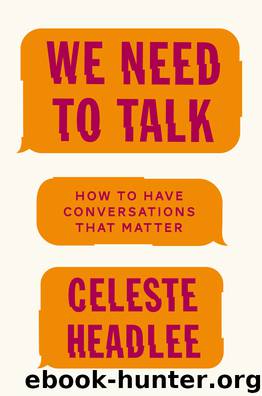We Need to Talk by Celeste Headlee

Author:Celeste Headlee
Language: eng
Format: epub
Publisher: HarperCollins
Published: 2017-08-01T04:00:00+00:00
In the interest of full disclosure, I want to be clear about my perspective on this issue. I’m a mixed-race woman whose ancestors were slaves on a Georgia plantation. I can’t pretend that I’m unbiased on the Confederate battle flag, as the flag is a symbol of torture, oppression, and enslavement to me.
However, I’m also a professional journalist and I welcome an open, honest conversation from all sides on the issue. I don’t make public policy. My job is to give you all the information and let you decide as objectively as possible. . . . As always, we don’t just welcome your comments, we’d love you to enter the conversation with us.
Those interviews were among the hardest I’ve done in my long career. Some of the things people said were personally hurtful and painful to hear. I was often tempted to argue or interrupt, but I remained professional and curious, and it paid off. I have since had great conversations with members of the Sons of Confederate Veterans. I don’t agree with them on this issue, but I understand them better.
Our differing opinions on this one issue of the battle flag didn’t interfere with our ability to talk to one another or respect one another, and it doesn’t necessarily follow that because we disagree on this, we disagree on everything. Furthermore, our disagreements didn’t prevent us from listening to one another. In order to have important conversations, you will sometimes have to check your opinions at the door. There is no belief so strong that it cannot be set aside temporarily in order to learn from someone who disagrees. Don’t worry; your beliefs will still be there when you’re done.
If you’re like most people, you probably tend to avoid engaging in conversation with people you think are bigoted. We imagine that those who are less educated or less intelligent than we are probably don’t have as enlightened a worldview.
But that would be your bias showing.
While we assume that smarts and education make us more open-minded than people less educated or intelligent, the truth is that research shows that the smarter you are, the more susceptible you are to bias. “If anything,” the study reads, “a larger bias blind spot was associated with higher cognitive ability.”2
This is all part of what’s called unconscious or implicit bias. These are biases that affect our judgment but that we’re unaware of and sometimes not even in control of. They are stereotypes, either positive or negative, of others that influence our views of them. Conscious biases are often choices we make about what we like or don’t like: you prefer employees who dress professionally or you like waiters who call you “sir.” Unconscious biases are harder to change because we often don’t know we have them.
But maybe you’re willing to accept that you have biases. You may think you’re aware of your own prejudices and are actively working to eliminate them. That might be true on some level, but there’s no evidence that people
Download
This site does not store any files on its server. We only index and link to content provided by other sites. Please contact the content providers to delete copyright contents if any and email us, we'll remove relevant links or contents immediately.
We Need to Talk by Celeste Headlee(4891)
Pre-Suasion: A Revolutionary Way to Influence and Persuade by Robert Cialdini(3433)
Captivate by Vanessa Van Edwards(3312)
I Love You But I Don't Trust You by Mira Kirshenbaum(3243)
Goodbye Paradise(2987)
How to Win Friends and Influence People in the Digital Age by Dale Carnegie & Associates(2841)
How to win friends and influence people by Dale Carnegie(2836)
The Hard Questions by Susan Piver(2561)
Fluent Forever: How to Learn Any Language Fast and Never Forget It by Gabriel Wyner(2461)
The Dictionary of Body Language by Joe Navarro(2442)
Surrounded by Idiots by Thomas Erikson(2371)
The Story Factor: Inspiration, Influence, and Persuasion through the Art of Storytelling by Annette Simmons(2253)
Just Listen by Sarah Dessen(2187)
How to Be Yourself by Ellen Hendriksen(1944)
The Power of Moments by Chip Heath & Dan Heath(1897)
Behave: The Biology of Humans at Our Best and Worst by Robert M. Sapolsky(1830)
How to Make Small Talk by Melissa Wadsworth(1806)
Not Nice: Stop People Pleasing, Staying Silent, & Feeling Guilty... And Start Speaking Up, Saying No, Asking Boldly, And Unapologetically Being Yourself by Dr Aziz Gazipura PsyD(1763)
The Small BIG Small Changes that Spark Big Influence by Steve Martin & Noah Goldstein & Robert Cialdini(1547)
